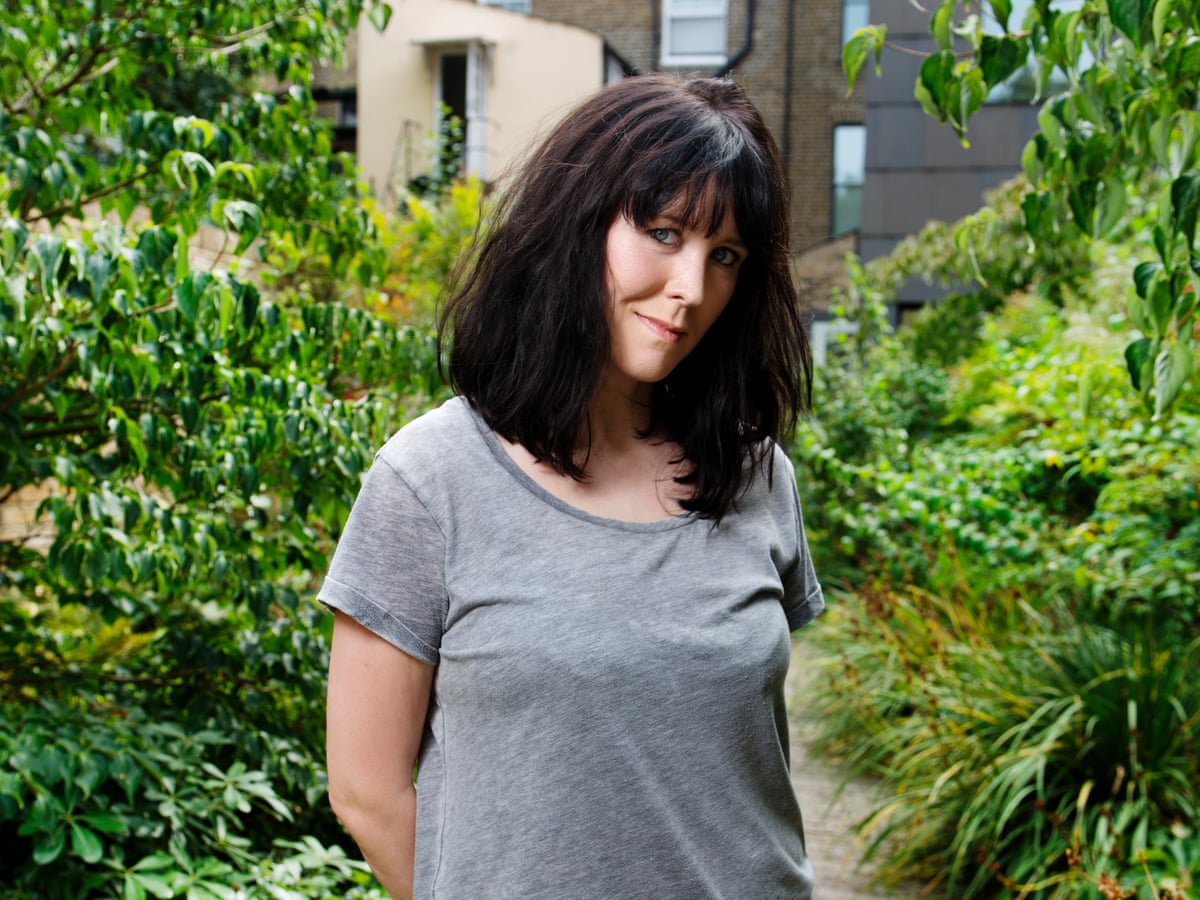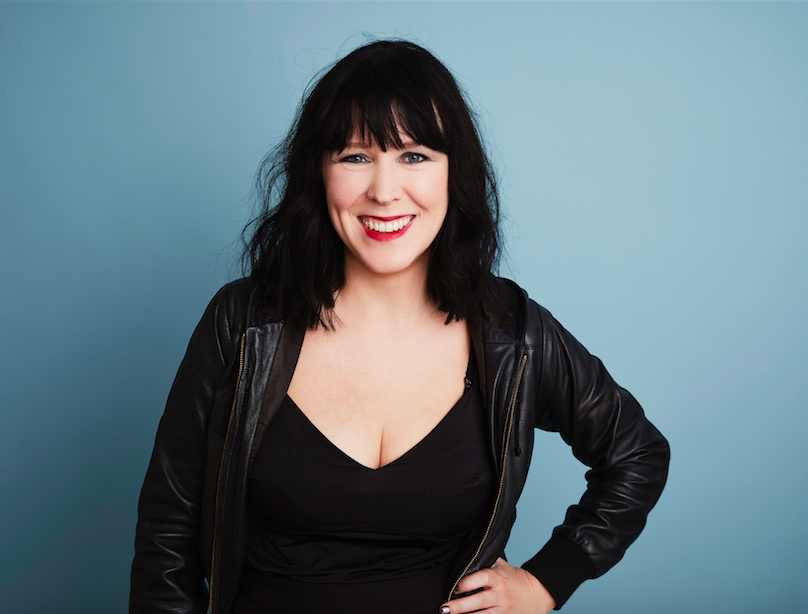Our Filmmakers’ Club members were treated to an exclusive Q&A session from Renaissance woman, and screen industry polymath, Alice Lowe, on 8 January, as part of the first Filmmakers’ Club event of 2022.
We were so thrilled to host Alice, who shared some incredible stories from her rich and varied career, spanning the worlds of comedy, television, and film, as well as some amazing pieces of practical, down-to-earth advice for our emerging filmmakers.
 Image credits (c) The Guardian
Image credits (c) The Guardian
Alice has written and starred in the Ben Wheatley directed ‘Sightseers’ (2012), and wrote, directed, and starred in the comedy horror feature ‘Prevenge’ (2016), which she accomplished while pregnant. She has written three seasons of ‘Alice’s Wunderland’, a surrealist comedy for BBC Radio 4, and is currently in production for her next film, ‘Timestalker’. Alongside her writing and directing projects, Alice has starred in films such as Edgar Eright’s ‘Hot Fuzz’ (2007), the children’s TV educational series ‘Horrible Histories’, and Charlie Brooker’s interactive episode ‘Black Mirror: Bandersnatch’ (2018).
The event took place on Zoom, and attendees had the opportunity to put their own questions to Alice. Scroll down to read through a selection of some of Alice’s comments and advice from this event.
On comedy, and finding your niche:
Comedy was not the industry I thought I was going to go into. Comedy as a niche is a much smaller pool; once you get involved in it, you get to know everyone in the comedy world. I specialised quite early on in my career, which I think is not a bad idea. Really decide which small field you want to be a part of. Although I didn’t really decide, I just sort of fell into it!
Alice Lowe
At that stage there were not many women in comedy. 20 years ago, if you went to Edinburgh, there were hardly any female performers. There are many more women trained to be actresses than there are parts for women in film and TV. But in comedy, it was a bit more of an open field for women, even though there weren’t as many women around, which was it’s own challenge in a way.
Alice Lowe
On making the jump from acting to writing:
I didn’t think of myself as being a writer, so it took a bit of a mental switch. I was being offered this opportunity which I couldn’t turn down. I found that I really, really loved writing, and that’s actually what I should have been doing all along! I realised that rather than sitting passively, as an actor, waiting for someone to hire me, I could write my own material.
Alice Lowe
On confidence and imposter syndrome:
Financial security did not arrive until I was in my 30s. My 20s was one big scramble for survival, financially. I also struggled with confidence; I wasn’t sure if I was good enough. I was still learning my craft. There was always this feeling of imposter syndrome. It’s very hard to work out what you actually want to do. Sometimes you can feel like you’re not succeeding in something because you’re not trying the right path, which is actually a very normal process, I think.
Alice Lowe
In your 20s you’re supposed to make mistakes. Creativity is a reward in itself. I would still be doing what I do even if it wasn’t paying me. Get on with making things, and learning, and don’t focus too much on the success or failure of it. The people who have that attitude are the ones who succeed. And those are the people who get the work. People can sense that you’re serious and you have a sense of integrity about what you’re doing.
Alice Lowe
Showing confidence is not about pretending that you’re brilliant or perfect. Real confidence is saying that you don’t know. As a young person, how would you know everything? And no one ever knows everything! Being able to say “I don’t understand that, could you explain it to me?”, that’s actually a confident thing to do. It shows that you want to learn.
Alice Lowe
 Image credits (c) The Guardian
Image credits (c) The Guardian
On creating your own opportunities:
I think you have to take the power into your own hands. With the internet, everything has changed so much. You can get a really cheap camera and film your own stuff. You can make your own film, which you wouldn’t have been able to do 20 years ago. The fact that you can put your film on YouTube, it can become a viral sensation, and be watched by millions of people, that changes everything. You can prove your material works in a completely different way.
Alice Lowe
It is a stressful industry; there are ups and downs emotionally. It’s very hard to find an equilibrium with that. Really you have to treat it like a job. It’s not enough to say “I started a script, I’ve got a brilliant first three pages”. No one can critique or use your work unless you’ve finished the whole thing.
Alice Lowe
On continuous learning:
The more you do it, the better you get. Keep on making short films, even if there isn’t an audience for them. Every shoot you’re on, and script you write, you’re getting better and better. I’ve been writing a lot over the last two years, and I’ve become a much better writer because of that. It’s like practicing the piano. No matter how much natural talent or skill you might have, you have to keep honing your craft. With my work, I don’t always think, “What do people want to see, what’s going to sell”, but actually, “What do I want to learn next?”. It’s a good way to push yourself, and each time you’re moving your skills up a notch.
Alice Lowe
Make your mistakes early, Get the first draft, the bad draft, out as soon as you can. Your first film might be terrible, your first script might be terrible, but you’re not going to get better until you’ve got it out there. While you’re sitting there and dwelling on your ideas, someone else has made four short films and written a script for a feature. You can’t hang around, you have to just do it. You need to have something to show for your work; a short film, a script, or a few scenes you’ve shot. It’s better to have smaller ideas that you can make now, and show to people, than a huge big budget idea that will take years to get made.
Alice Lowe

On collaboration, and finding your tribe within the industry:
A hidden resource is the collaborators you have around you. You have to find your gang of people who you will work with. You have to find the people who believe in you so much, that they think it’s worth making your film for free. The people who manage to do their things, on their own terms in the industry, usually have their gang of friends and collaborators around them to support them. They collaborate together, and they probably did it for free to begin with. If you get on with someone, or you have a similar sensibility creatively, you have to hold onto them, because you could still be working with them in 20 years’ time.
Alice Lowe
Your peers are really important. If they have talent, you can collaborate and go up in your career together. You will be more than the sum of your parts. Loads of my collaborators are people who I met at a stage when I wasn’t being paid, but we were just making material together. You need that friend who will say, “Yes you can film in my garden”, “My mum will make us lunch if we make a short film”. Write a script based on a space that you already have access to film in. See what resources you already have around you and build on them.
Alice Lowe
I often give scripts to friends, and they give theirs to me. We do script swaps and give notes to each other. Using that resource, that you don’t have to pay for, in an intelligent way, is vital. You have to be able to accept notes and feedback, that is the job. There is no world where you will hand in a script and someone will think it’s perfect. You may as well get used to the criticism early, from your friends, rather than thinking you will never need to respond to notes from producers. Even people who are paying you will give you notes that you don’t like. You need to learn to field those and respond to them.
Alice Lowe
On writing:
I never start writing without having a structure, now. Starting with dialogue or character, it’s like buying the lamps before you’ve built the house. Build your house, get the structure in place, and then when you’ve done all the building, you can do the fun stuff like picking the pillows and the wallpaper; the dialogue, the quirks and details of the characters. I definitely have a process now, where I build the story up brick-by-brick.
Alice Lowe
On being a woman in the industry:
I will always passionately fight to get my ideas through, from a female perspective. People think it isn’t realistic because they’re not used to seeing it on screen. Sometimes you are fighting for things that you think aren’t shown on screen, and should be. It’s always about improving the work and making sure it’s as good and truthful as it can possibly be. If people think you’re fighting from a place of ego, you’re never going to win. You have to be fighting to make the work better, and defend the work.
Alice Lowe
 Image credits (c) Red Online
Image credits (c) Red Online
Here’s what our attending club members had to say about this fantastic Q&A session with Alice Lowe:
Thank you so, so much for your really brilliant advice. This has really resonated - thank you Alice and LFA for a brilliant Q & A!
Annabella
Very inspiring. Thank you ❤
Giovanni
Thank you Alice and LFA! This was very informative and enjoyable.
Sam
Thank you so much to Alice for joining us for our first Filmmakers’ Club event of 2022.
To find out more about our Filmmakers’ Club, click here, and keep your eyes peeled on our Events page for our exciting upcoming events.
 Image credits (c) The Guardian
Image credits (c) The Guardian Image credits (c) The Guardian
Image credits (c) The Guardian
 Image credits (c) Red Online
Image credits (c) Red Online